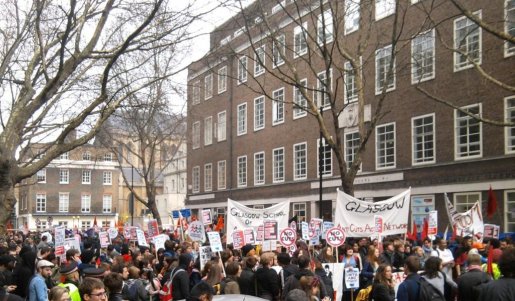Students to Fight University of London Union Closure


Students at universities in London are facing a battle to keep the city's student union after senior academics decided it was to close next year. The University of London Union (or ULU) represents the students from all of the 18 different institutions that make up the University of London, including LSE and UCL. However, facing tougher and tougher cuts, the university's collegiate council decided that from 2014 the individual colleges would cease paying the current £750,000 a year each to ULU.
Social & Political Hub
In its current form, ULU is the largest association of its kind in Europe and is central to the social and political life of 120,000 students in the Bloomsbury area and throughout London. The new plan will maintain the social facilities "including the swimming pool, gym, shops, cafes, bars, venues and the administrative support for intercollegiate sporting events".
However, it is the political side of the union that many fear losing. ULU has traditionally been the hub for student politics and activism, uniting all students across London in events such as the fees protests over the last few years. In the new plans, there will be no elected officers and therefore no student representation.
The committee that made the decision played down this side of the union, releasing a statement explaining that the political function of ULU could be replaced by "a focused, well-supported pan-London operation, responsible for co-ordinated campaigning, lobbying and representation for London students on London issues".
Supporters of the changes point to the fact that just 2% of students voted in the latest ULU elections and many focus their political interests more on their specific university's union.
Students Vow to Fight
The decision has been met by widespread condemnation from everyone from students to politicians. The current ULU president Michael Chessum voiced the arguments that many are making:
"This decision is totally illegitimate and will have a majorly negative impact on student life and representation in London: no student sat on the review panel, no student got a vote on the decision, and student responses have been ignored or brushed aside throughout. If the university goes ahead with this, they will be saying far more about their own mortality as an institution than they are about us. And the battle won't end there."
The decision still needs to be approved by the university's board of trustees, and a huge student demonstration is expected to coincide with the meeting on 22nd May. Students from across London hope to show the overwhelming unpopularity of the decision by staging a sit-in.
Their cause has been backed by several senior politicians, including former mayor of London Ken Livingstone and two Labour MPs who wrote an open letter to the Guardian criticising the new plans:
"As politicians from across London, we understand the value of having a strong student movement in London. Students, like many London residents, face issues of poverty, appalling housing conditions and attacks on public services. We cannot afford to lose the core of what could be a major force for good in the capital."
Are you a student in London? Is ULU a part of your every day life or do you barely relate to it? Let us know in the comments section below.








